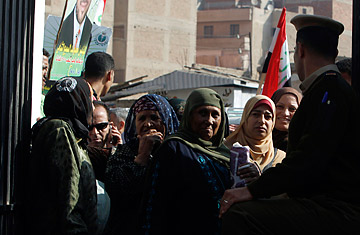
Supporters of Egypt's Muslim Brotherhood wait outside a polling station at Mahalla El Kubra, north of Cairo, on Nov. 28, 2010
Few Egyptians showed up to vote in their country's parliamentary election on November 28. Those who did said they were met with fraud, confusion, and long waits—odd, given the short lines. Plenty who did bother to turn out never actually made it through the doors of polling stations to cast their votes.
"Every hour or so, they let five to six people in," said Mustapha Maklet, a member of Egypt's largest opposition group, the Muslim Brotherhood, as he waited with throngs of people outside the closed gates of a polling station in the working class neighborhood of al-Haram.
For many Egyptians, Sunday's vote for the lower house of parliament—the first balloting of its kind in five years—was typical of the authoritarian regime's political process, and an ominous portent for next year's presidential race. Voters and independent monitors complained of police intimidation, ballot stuffing, and bribery. Independent monitors wielding government accreditation said police barred them from entering the polling stations. Trucks of riot police stood ready in opposition strongholds. And plainclothes police and representatives of local ruling party candidates restricted the voters who could come inside. "Everybody voted in favor of the [ruling] National Democratic Party (NDP)—they were forced to," said businessman Salah al-Sayeh, describing his voting experience in the central Cairo district of Attaba. "Whether we like it or not, NDP is totally in control."
Analysts say the aging regime of President Hosni Mubarak has cracked down even harder than usual this year in an effort to tighten the party's grip on power ahead of the succession process that awaits when the 82-year-old President no longer holds office. The Muslim Brotherhood captured 20% of the seats here in the 2005 parliamentary race, cementing its position as the leader of the opposition. But despite its continued popularity, the group faced little chance of a repeat win on Sunday. "They have us form a queue, but then they intentionally slow it down so that people give up," said Abdel Monem Sayed, an engineer who waited several hours to cast his vote for the Brotherhood. "They want to keep people on the outside because there's fraud on the inside."
On the inside, that fraud wasn't always apparent, but the emptiness was. Handfuls of hopeful voters clustered around stacks of paper near the entrances, struggling to find their names in lists hundreds of pages long that they said were not alphabetized and rife with misspellings. Men who identified themselves as representatives for the ruling party prowled the courtyards of polling stations; one followed TIME's reporter from room to room, declaring: "An American, here to interfere in Egyptian affairs" to all who would listen. But in most of the polling stations that TIME visited throughout Cairo on Sunday, few if any people could be seen casting votes. And shortly before the polls closed in the evening, most ballot boxes appeared to contain little more than a couple dozen ballots.
Still, the inactivity inside didn't stop the crowds from swelling outside. Despite an official end to campaigning two days before the election, trucks plastered with political paraphernalia blasted the names of candidates from bullhorns, and adults and children distributed leaflets to passersby. "These are not voters. They're all candidates' supporters who came to campaign," said a lawyer, Ezzat al-Sharif, gesturing to the crowd of people jostling outside a polling station at the Shubra al-Beled Primary School in Shubra al-Kheima, an industrial suburb north of Cairo.
Talk of bribery and coercion was also widespread. Voters complained that plainclothes authorities in the polling stations had told them how to vote—and for whom. Many said that votes were being bought. "The price [for a vote] has reached 55 Pounds ($9.65)," said one policeman outside the Yousef Gadalla Language School polling station in Giza, where the glass ballot boxes—meant to provide some literal transparency—had been papered over. At other polling stations, supporters handed out food to voters on behalf of certain candidates.
And in some areas, the murmurs of fraud turned into shouts, protests and violence. At the Aziz al-Masry School in Giza, Muslim Brotherhood supporters had grown so frustrated at being denied access to the vote that by nightfall, they launched a protest, chanting: "Whoever participates in any act of fraud will have his arm paralyzed," as the crowd pushed violently against the school gates. In Shubra al-Kheima, a Muslim Brotherhood stronghold, the group charged that police fired shots into the crowd after shutting down the polling station early. The Associated Press reported clashes between Brotherhood supporters and police in the southern town of Qena, and in the Sinai Peninsula, a gun battle broke out between the supporters of rival NDP candidates.
Voters and candidates said they expect to see an even larger ruling party victory this year than they did in the last election. And for the vast majority of Egyptians who avoided the polls, that shouldn't be the least bit surprising. "Why should I vote? They distribute money to buy votes," said Mustapha Abdallah, who owns a Cairo shoe store a block away from a polling station where by closing time, the ballot boxes remained almost empty. "Those people [who are trying to vote] have been paid," he sighed. "The people who understand don't bother."
